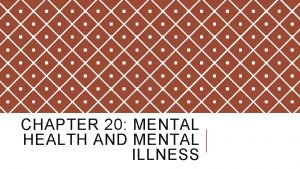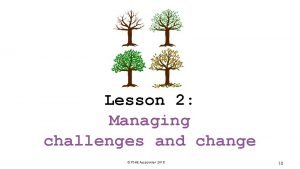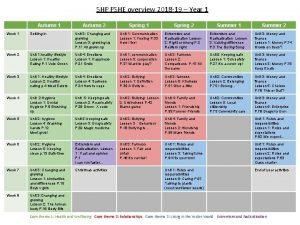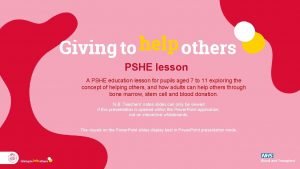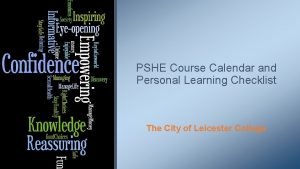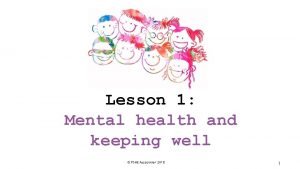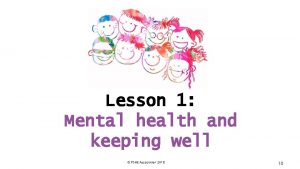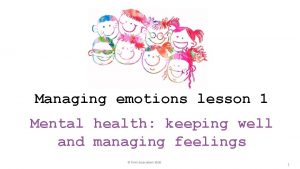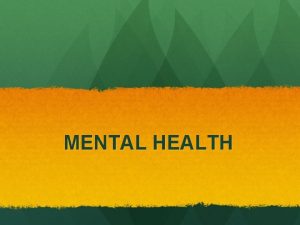Lesson 1 Mental health and keeping well PSHE

![Ground rules [Add your class rules here] © PSHE Association 2018 11 Ground rules [Add your class rules here] © PSHE Association 2018 11](https://slidetodoc.com/presentation_image_h2/5add45aba7d186848b0b966e8449cd6b/image-2.jpg)










- Slides: 12

Lesson 1: Mental health and keeping well © PSHE Association 2018 10
![Ground rules Add your class rules here PSHE Association 2018 11 Ground rules [Add your class rules here] © PSHE Association 2018 11](https://slidetodoc.com/presentation_image_h2/5add45aba7d186848b0b966e8449cd6b/image-2.jpg)
Ground rules [Add your class rules here] © PSHE Association 2018 11

Mental health: What’s our starting point? Write down all the words, feelings and emotions you think are associated with mental health. © PSHE Association 2018 12

We are learning about mental health; what it means and how we can take care of it We will be able to: explain what is meant by the term ‘mental health’ identify everyday behaviours that can help to support mental (and physical) health recognise that we can take care of our mental health (as well as our physical health) © PSHE Association 2018 13

What is mental health? Look at the definitions of mental health displayed around the classroom. Stand next to the one which you feel best sums up what mental health is. Be ready to give reasons for your choice. © PSHE Association 2018 14

What is mental health? Mental health can be thought of as being on a scale that can move up or down, a bit like a thermometer. We can move along the scale at any time, between being healthy or unwell. There are things we can put in place to help us feel better and move out of the struggling or unwell areas. © PSHE Association 2018 15

Signs of wellbeing How do we know if someone feels good: - in their body (physical health)? - in their mind (mental health)? How do we know if someone does not good: - feel in their body (physical health)? in their mind (mental health)? Remember we cannot always tell – sometimes illness or ill-health is not obvious to others (either physical or mental health) © PSHE Association 2018 16

Activities for health Card Sort – Physical health Card Sort – Mental health Things we should do: - Every day - Sometimes - If there is a problem - Rarely or not at all © PSHE Association 2018 17

Mental health thermometer Plot Jay’s mental health on thermometer. How could Jay strengthen the ability to cope in order to avoid moving into the struggling zone? How could this reduce Jay’s chances of being in the unwell area? © PSHE Association 2018 18

What strategy from today’s lesson could we use in our own lives? Talk to a trusted adult at home or at school Child. Line: www. childline. org. uk 0800 1111 © PSHE Association 2018 19

Mental Health Go back to the activity ‘What’s our starting point? ’ Is there anything you would like to change? Is there anything you would like to add? Use a different coloured pen or pencil to amend your first thoughts activity and show your thinking has developed or changed. © PSHE Association 2018 20

More activities Top tips checklist Create a top tips checklist to help people take care of their mental health. Who might be a good audience to write for? (other pupils in school, parents/grandparents or teachers? ) © PSHE Association 2018 21
 Chapter 20 mental health and mental illness
Chapter 20 mental health and mental illness Keeping an infant safe and well section 7-3
Keeping an infant safe and well section 7-3 Keeping an infant safe and well section 7-3
Keeping an infant safe and well section 7-3 Stress management jeopardy
Stress management jeopardy Pshe financial literacy
Pshe financial literacy Pshe living in the wider world
Pshe living in the wider world Pshe association
Pshe association Pshe ssa
Pshe ssa Pshe association explainer slides
Pshe association explainer slides Pshe calendar
Pshe calendar North tyneside camhs
North tyneside camhs Sanitary well parapet wall
Sanitary well parapet wall Not well defined set examples
Not well defined set examples
